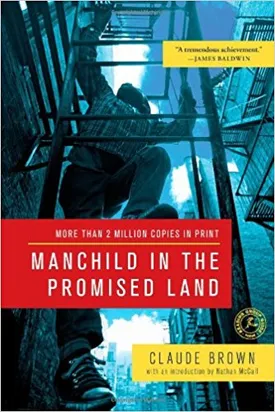Claude Brown
Claude Brown, born on 20th May 1937, was an American author known for his iconic novel written in 1965; Manchild in the Promised Land. Brown was born in Harlem, New York, and after a childhood of poverty, he eventually found success as a bestselling author. His writing reflects his unique and hardscrabble life experience and offers an authentic, gritty glimpse into the lives of those living in the inner city of New York at the time.
Brown’s life was not easy. He was born to a single mother and their family often struggled to make ends meet. At age 8, he was arrested for stealing a purse and was sent to a reform school. For a while, he tried his hand at being a small-time thief, but that only led him to even more trouble with the police. In an effort to keep him out of trouble, his family sent him to a military boarding school in Pennsylvania until he was 15. After returning to his hometown, he continued with his criminal activities and was eventually sent to jail for burglary. During his sentence in jail, Brown was deeply inspired by a group of academics and began to extract knowledge from books that were available in the prison library.
When Brown was released from jail, he dedicated himself to the task of acquiring education and knowledge. He earned a college degree and soon after, was accepted into Columbia’s School of Social Work. After graduating from Columbia, Brown decided to explore his writing skills which eventually led him to write his iconic novel, Manchild in the Promised Land.
Manchild in the Promised Land is an autobiographical novel which is an exploration of Brown’s own childhood experience. The story follows its protagonist, Sonny (based off of Brown), through a dystopian version of his own life in the inner city of New York. It details Sonny’s struggles of brotherhood, poverty, and the triumphs and struggles of everyday life in the inner city. The novel explores what it means to be a man without a family, as well as the systemic racism and robberies which were prevalent at the time. The novel offers a real and raw account of being a disadvantaged youth, but also shows a path of hope and of achieving something greater out of one’s troubles.
Manchild in the Promised Land was published in 1965 and quickly rose to prominence in both the African-American and mainstream literary worlds. It was praised for its unapologetic examination of urban life and its focus on social justice. Brown’s writing style is often compared to that of James Baldwin’s, with both authors being celebrated for their work which documented and celebrated African-American life.
Brown’s writing career did not end with Manchild in the Promised Land, as he continued to write stories that highlighted the struggles and successes of those living in the inner city. His 1971 novel If Beale Street Could Talk was included in the Library of Congress’ list of “Great American Reads”, and his work has been featured in various other books, films, and television series.
Today, Brown’s works remain to be important influences in the urban literature and youth culture. He was one of the first African-American voices to document the lives of those living in the inner city and as such, has become an influential figure in the urban literature world. His writing combines a raw and realistic portrayal of his own life with a strong message of hope, which is still inspiring readers today.

